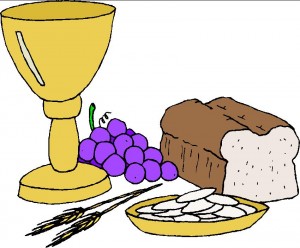The Future of the Eucharist – Mark Rich

Read Angie Mabry-Nauta’s essay, “Let the Children Come”
Read Christopher Duncanson-Hales essay, “Manifest Grave Sin”
Ok, so let’s get this one thing out of the way. On a blog that’s mostly devoted to the virtual voices of assorted Calvinists, I’m a Lutheran eucharist junkie. (But you already knew that because I used the word ‘eucharist.’)
To one who’s totally committed to the living presence of Christ, the eucharist is one of the things that particularly concerns me. It is what Jesus has given us to be his ordinary presence among us whenever two or three are gathered together in his name. (I say ‘ordinary’ here simply in order not to foreclose the possibility of his presence in his own form, which is something that continues to happen far more often than we Christians like to think about.) God calls us to be the people of the presence of Christ in the midst of a culture that practices absence.
The meal of Christ’s presence enacts the dual great command to love God and to love one another as God loves us. As with any kind of love, it is never enough merely to talk about it. Through this meal that is Christ, God enacts paradigmatically the divine-human covenant love that is salvation in Christ.
So here is the burden of my argument. The eucharist suffered a grievous blow in the second century when, under the force of the imperial ban on religious meals, the Christians were forced to turn it into a snack by separating out the initial bread and the closing cup of blessing from the rest of the meal. So long as we Christians continue the snack we continue to short-change, even fetishize, the fullness, majesty, and power of the eucharist. We should return it to the original full meal.
In an e-mail to me Frank Senn disagreed with me on this point, and he is certainly the greater historical authority in this area. He correctly pointed out that once the imperial ban was lifted the early Christians continued to keep their meal and the sacrament separate, observing the former in the evening and the latter in the morning.
Yet my argument isn’t principally with the past, but with the present and the future. The global consumer/corporate/commercial culture continues its relentless march of commoditizing and virtualizing our lives, our minds, and our bodies. (Fortunately for us they haven’t figured out a way of commoditizing our souls; they seem to be content with simply ignoring and even denying the existence of souls.) A key strategy of this commoditization is to control, commoditize, and commercialize our food and our eating.
It is one of the main ways the corporations occupy our bodies (with an overt tip of the chapeau to OWS!) and through them our minds. The eucharist is one of God’s main ways to counter-occupy our minds and our lives with the love that the corporations can never give, the self-giving sovereign love of Jesus that removes the sin of the world.
In our weakened current state, I think that we will be substantially helped and strengthened if we return the eucharist to the meal (a potluck meal, by the way!) that Jesus means it to be. In that way we more fully experience the love of God and neighbor.
You may rightly respond that such a strategy may not work, and you might be right. After all, wouldn’t such a meal merely continue the same commoditization of our eating that already plagues us? How would adding more food to the eucharist, in the midst of a culture that both multiplies and debases food, liberate us?
I have two replies. The practical answer could be for a church to deliberately choose food and cooking that do not encourage commodified eating. In other words, don’t debase the eating but rather ennoble it. At Peace Lutheran Church in Holland, Michigan, we have been eating the eucharist in this way once a year on Maundy Thursdays since 2005. Under the leadership of the irreplaceable Tracy Barnett, the meal has been a model of locally-produced and personally-prepared goodness. Wednesday evening and much of Thursday is devoted to meal preparation, and with many hands and voices (and some moderate oenic assistance), the work becomes at least somewhat play. More importantly, the meal becomes undeniably our own labor of love, rather than the slop of convenience.
The more important spiritual answer is that this meal is explicitly held with Jesus Christ as host. This one thing makes the meal and those who eat it not merely temporarily full in their bellies but spiritually and morally better. He is revealed as the true master of all our eating, all our lives, and all God’s world. In this one act all the power and sway of the corporations and their advertizing is instantly dethroned by being put into the context of Christ’s humbler and greater lordship. Furthermore, his lordship over this one meal extends by imitation over all meals that Christians eat.
A significant intermediate step toward this great consummation might be another of the practices of some of the early Christians, the blessing of foods at the Eucharistic table. These then go out of the assembly to grace and bless the tables of the believers to make explicit for them through all of the week that Christ is the lord of all their eating and that all of their eating is an extension of the one central table.
May all your Thanksgiving feasts be blessed by the One who is the reason for all our thanks!
Read Angie Mabry-Nauta’s essay, “Let the Children Come”
Read Christopher Duncanson-Hales essay, “Manifest Grave Sin”


Thanks Mark! What a great reminder of who the host is this week in all the craziness of shopping, prepping, cooking and eating!